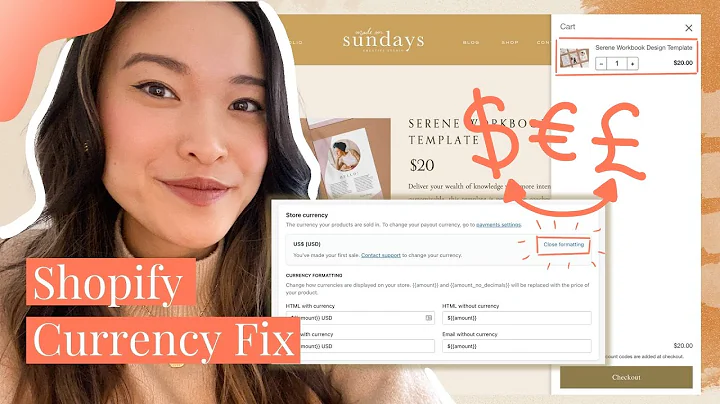Shopify vs Wix: A Detailed Comparison
Table of Contents:
- Introduction
- Shopify vs Wix - A Brief Comparison
- Features of Shopify
3.1. Scalability
3.2. Customer Support
3.3. Integrations
3.4. E-commerce Features
3.5. Reporting and Sales Analytics
- Features of Wix
4.1. User-Friendliness
4.2. Design Templates
4.3. App Marketplace
4.4. E-commerce Functionality
- Pricing
5.1. Shopify Pricing and Plans
5.2. Wix Pricing and Plans
5.3. Additional Costs and Fees
- Ease of Use
- Design Options
7.1. Design Flexibility of Wix
7.2. Design Templates of Shopify
- Integrations
8.1. Wix App Market
8.2. Shopify Integrations
- Customer Support
9.1. Wix Support
9.2. Shopify Support
- Conclusion
Shopify vs Wix - Which Website Builder is Right for You?
In this article, we will compare two popular website builders, Shopify and Wix, and help you determine which one is the best fit for your needs. Both platforms offer the ability to create a website easily and quickly, as well as sell products and services online. We will dive deep into the features, pricing, ease of use, design options, integrations, and customer support provided by both Shopify and Wix. By the end of this article, you will have all the information you need to make an informed decision and choose the right website builder for your business.
Introduction
When it comes to creating a professional website and selling products online, Shopify and Wix are two platforms that often come to mind. Shopify is known for its scalability, extensive e-commerce features, and strong reporting and sales analytics. On the other hand, Wix is highly user-friendly, offers a wide variety of design templates, and has a rich app marketplace. In this article, we will compare these two website builders, analyzing their features, pricing, ease of use, design options, integrations, and customer support. So, let's dive in and find out which website builder is the best fit for you.
Shopify vs Wix - A Brief Comparison
Before we dive into the details, let's start with a brief comparison of Shopify and Wix. Shopify is a powerful e-commerce platform built specifically for creating online stores. It offers scalability, excellent customer support, a wide range of integrations, and extensive e-commerce features. On the other hand, Wix is a user-friendly website builder that focuses on creating content-rich websites with basic e-commerce functionality. It offers a wide variety of design templates and a large app marketplace. Now, let's explore the features of each platform in more detail.
Features of Shopify
-
Scalability: Shopify is known for its ability to scale. Whether you're starting a small business or already have a large online store, Shopify can accommodate your needs.
-
Customer Support: Shopify offers excellent customer support with 24/7 live support via email, chat, and telephone. They also have an extensive online help center and an active community forum.
-
Integrations: Shopify boasts over 6,000 integrations, allowing you to enhance the functionality of your online store with various apps and plugins.
-
E-commerce Features: Shopify provides a wide range of e-commerce features, including secure online payments, product variations, shipping options, and abandoned cart recovery.
-
Reporting and Sales Analytics: Shopify offers robust reporting and sales analytics tools, giving you insights into your store's performance, customer behavior, and sales trends.
Despite its strengths, Shopify has a few downsides. The higher-tier plans can be pricey, and the number of free templates is limited. Additionally, for those new to website building, Shopify may not be as intuitive as more basic website builders. The e-commerce features are also limited in the lowest-tier plan.
Features of Wix
-
User-Friendliness: Wix is incredibly user-friendly, making it ideal for beginners and those with limited coding and design skills.
-
Design Templates: Wix offers over 800 design templates, providing a wide range of options for creating a visually appealing website.
-
App Marketplace: Wix has a large app marketplace with over 300 third-party integrations. These apps can enhance your website's functionality and improve user engagement.
-
E-commerce Functionality: While not as robust as Shopify, Wix offers basic e-commerce functionality. You can collect payments for services or sell a limited number of items.
Wix's affordable website plans and more design flexibility make it an attractive choice for those who need a content-focused website with basic e-commerce functionality. However, compared to Shopify, Wix's e-commerce features are limited, making it less suitable for large online stores.
Pricing
Let's compare the pricing and plans of Shopify and Wix to understand the cost implications of each platform.
-
Shopify Pricing and Plans: Shopify offers a range of pricing plans to suit different business needs. The plans start at $29 per month and go up to $299 per month. Shopify also offers a three-day free trial, and after that, you will be charged $1 for the first three months.
-
Wix Pricing and Plans: Wix offers a free plan with limited features, as well as seven paid plans starting from $16 per month and going up to $59 per month.
It's important to note that both platforms have additional costs and fees associated with online payment processing, custom domains, SSL certificates, and other features.
Ease of Use
When it comes to ease of use, both Shopify and Wix have their strengths. Wix is built for those who need a professional online presence but have limited coding and design skills. Its user-friendly drag-and-drop editor allows you to easily customize your website. Wix also offers an Artificial Design Intelligence (ADI) editor, which designs your website based on your preferences. On the other hand, Shopify is more intuitive if you're building an online store, especially if you plan to scale it. Building a basic business website is easier with both platforms, but for a full-fledged online store, Shopify provides more guidance and features.
Design Options
Design plays a crucial role in creating a visually appealing and engaging website. Let's take a closer look at the design options offered by Shopify and Wix.
-
Design Flexibility of Wix: Wix offers extensive design flexibility with its user-friendly drag-and-drop editor. You can customize your website to match your business needs and preferences easily. Additionally, Wix's ADI editor designs your website for you based on a few questions and basic visual preferences.
-
Design Templates of Shopify: Shopify provides 10 free design templates, each with two to three variations. If you're looking for more design options, Shopify also offers over 70 premium themes, which come at an additional cost ranging from $150 to $3,250 or more.
Both Wix and Shopify offer design options that allow you to create visually appealing websites. However, Wix's drag-and-drop editor provides more flexibility, while Shopify's templates focus more on e-commerce functionality.
Integrations
Integrations with third-party apps and services are essential for enhancing your website's functionality. Let's explore the integrations offered by Shopify and Wix.
-
Wix App Market: Wix has an app marketplace with over 300 third-party integrations. These integrations can help you collect leads, analyze website traffic, improve visitor engagement, and enhance your website's design. Popular third-party apps available on Wix include Privy, Overtok, Conversio, and Printful.
-
Shopify Integrations: Shopify excels in integrations, offering over 6,000 options that are eCommerce-focused. These integrations enhance your online store's marketing efforts, customer engagement, shipping, inventory management, and more. Popular Shopify apps include Oberlo, Shippo, SKU IQ, Printful, and Etsy Shop.
Both platforms offer a wide range of integrations, but Shopify provides a much larger selection, especially when it comes to eCommerce-focused integrations.
Customer Support
Having prompt and reliable customer support is crucial when building and managing your website. Let's compare the customer support offered by Shopify and Wix.
-
Wix Support: Wix offers customer support through its help center, which includes extensive documentation and FAQs. For paid plans, Wix provides call back and email support. Customer inquiries are usually addressed within 24 hours on business days. Wix also offers priority support for VIP plan customers.
-
Shopify Support: Shopify provides 24/7 live support via email, chat, and telephone. They also have an online help center with guides, FAQs, and tutorials. Additionally, they have a large online community forum with nearly 900,000 members.
When it comes to customer support, Shopify's 24/7 live support and active online community give it an edge over Wix.
Conclusion
In conclusion, the choice between Shopify and Wix depends on your specific needs and goals. If you require a feature-rich, scalable e-commerce platform with extensive integrations and strong reporting capabilities, Shopify is an excellent choice. Although Shopify's pricing plans can be pricey, the value provided justifies the cost. On the other hand, if you prioritize user-friendliness, design flexibility, and affordability, Wix is a suitable option. Wix's drag-and-drop editor, wide variety of design templates, and large app marketplace make it an appealing choice for content-focused websites with basic e-commerce needs. Consider your requirements and preferences carefully and make an informed decision between Shopify and Wix for your website building journey.
Highlights:
- Shopify and Wix are popular website builders known for their different strengths and features.
- Shopify excels in scalability, customer support, integrations, and e-commerce features.
- Wix is highly user-friendly, offers extensive design flexibility, and has a rich app marketplace.
- Pricing varies between the two platforms, with Shopify plans being more expensive but offering more extensive e-commerce features.
- Ease of use, design options, integrations, and customer support also differ between Shopify and Wix.
- Choose Shopify if you need a feature-rich, scalable online store, and Wix if you prioritize user-friendliness and design flexibility for a content-focused website.
FAQ:
Q: Can I sell products online with both Shopify and Wix?
A: Yes, both Shopify and Wix allow you to sell products and services online. However, Shopify offers more extensive e-commerce features and integrations, making it better suited for online stores.
Q: Does Wix have a free plan?
A: Yes, Wix offers a free plan with limited features. However, to access advanced e-commerce functionality and remove Wix branding, you will need to choose one of their paid plans.
Q: Can I customize the design of my website on both Shopify and Wix?
A: Yes, both platforms allow you to customize the design of your website. Wix offers more design flexibility with its drag-and-drop editor, while Shopify provides design templates focused on e-commerce functionality.
Q: Are there additional costs and fees associated with Shopify and Wix?
A: Yes, both platforms have additional costs and fees, such as online payment processing fees, custom domain fees, SSL certificate fees, and fees for premium themes or apps.
Q: Which platform offers better customer support, Shopify or Wix?
A: Shopify offers 24/7 live support via email, chat, and telephone, making it more comprehensive. Wix also provides customer support, including call back and email support, but it may take longer to receive a response.
Q: Can I use third-party integrations on both Shopify and Wix?
A: Yes, both platforms offer third-party integrations. However, Shopify has a much larger selection, especially when it comes to e-commerce-focused integrations.


















